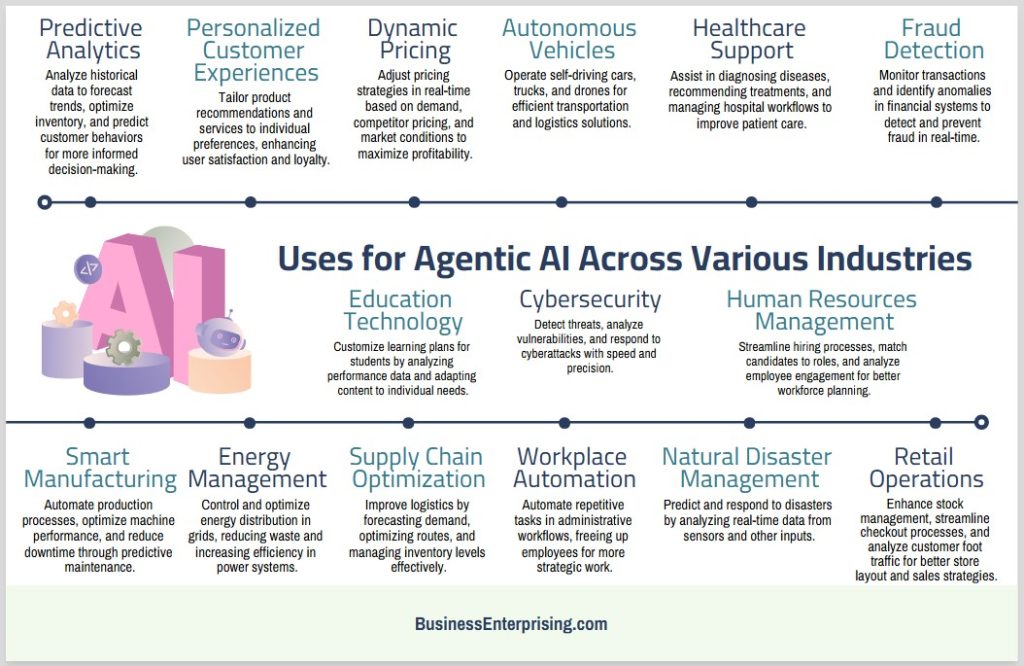
This advanced technology supports industries by automating tasks, analyzing data, and adapting in real-time to changing conditions. Additionally, it empowers businesses to streamline operations and make smarter decisions faster. Whether improving customer experiences or optimizing supply chains, agentic AI offers practical solutions.
As businesses face increasing demands for efficiency and agility, agentic AI provides tools to stay competitive. By exploring its applications, you can discover how this technology can enhance your strategies and create new opportunities. Its ability to adapt ensures its relevance in an ever-changing market.
Understanding Agentic AI
Agentic AI refers to artificial intelligence systems that operate independently, adapt to changing environments, and learn from data over time. These systems do not rely solely on predefined instructions but instead make decisions based on real-time inputs. By functioning autonomously, agentic AI can handle complex tasks and dynamic situations with minimal human intervention.
A key feature of agentic AI is its ability to learn continuously. It uses algorithms to analyze new information, refine its processes, and improve decision-making. This adaptability allows it to respond effectively to unexpected challenges or evolving conditions. For example, it can adjust manufacturing schedules or reroute logistics based on real-time data, enhancing operational efficiency.
Additionally, agentic AI adapts to new environments by understanding context and modifying its behavior. This capability makes it versatile and suitable for various industries, including healthcare, finance, and logistics. Therefore, businesses benefit from AI systems that are both efficient and responsive to their specific needs.
Understanding agentic AI and its uses helps you appreciate its transformative potential. By learning, adapting, and acting autonomously, these systems enable businesses to innovate and respond to market demands effectively. As this technology evolves, its impact on business operations will only continue to grow.
Core Capabilities of Agentic AI
Agentic AI stands out for its ability to make informed decisions, automate processes, analyze data, and adapt in real time. These capabilities enable it to handle complex tasks with precision and efficiency. By learning from data and responding to dynamic environments, agentic AI offers solutions that traditional systems cannot achieve.
One core capability is autonomous decision-making. Agentic AI evaluates multiple factors and selects the best course of action without requiring constant input. For instance, it can adjust inventory levels based on demand forecasts, ensuring smoother operations. Additionally, it streamlines workflows by automating repetitive tasks, allowing your team to focus on more strategic priorities.
Another strength lies in its data analysis capabilities. Agentic AI processes large volumes of information quickly, identifying patterns and generating actionable insights. Therefore, businesses can rely on it to predict market trends or optimize resource allocation. Its real-time adaptation further enhances its effectiveness, making it invaluable in fast-paced industries like logistics and finance.
Understanding agentic AI and its uses reveals how these systems address business challenges and create opportunities for growth. Whether automating processes or improving decision-making, agentic AI continues to redefine efficiency and innovation across industries. Its ability to adapt ensures it remains a powerful tool in solving emerging problems.
Industries Leveraging Agentic AI
Agentic AI has become a valuable tool across industries, improving efficiency and delivering better outcomes. Healthcare is a prime example of how agentic AI transforms processes. It analyzes patient data to predict outcomes and recommend personalized treatments. Additionally, it optimizes hospital operations, such as scheduling and resource management, improving patient care and reducing delays.
The finance industry also benefits from agentic AI and its uses. It detects fraud by identifying unusual patterns in transactions and flags potential risks in real-time. Moreover, it enables personalized financial planning by analyzing customer data and offering tailored recommendations. Therefore, financial institutions can provide better services while maintaining security and efficiency.
In logistics, agentic AI improves supply chain operations by forecasting demand, optimizing routes, and adapting to disruptions. For instance, it can reroute deliveries in response to weather changes or traffic conditions, ensuring timely shipments. Retailers also leverage agentic AI to personalize customer experiences by analyzing shopping behaviors and suggesting products. This targeted approach enhances customer satisfaction and increases sales.
Agentic AI is reshaping industries by offering tools that adapt to unique challenges and opportunities. Its ability to improve decision-making, automate tasks, and deliver actionable insights makes it indispensable. By understanding its potential, you can explore how this technology can transform your business operations.
Specific Use Cases of Agentic AI
Agentic AI has a range of practical uses that enhance business efficiency and decision-making. Predictive analytics is a notable example. By analyzing historical data, agentic AI identifies trends and forecasts future outcomes. For instance, it helps you predict customer demand, enabling better inventory management and reducing waste. Additionally, its ability to anticipate market shifts supports more informed strategic decisions.
Personalized customer experiences are another area where agentic AI shines. It analyzes user behavior to recommend products or services tailored to individual preferences. Therefore, you can improve customer satisfaction and loyalty while increasing sales. For example, e-commerce platforms use agentic AI to suggest items based on browsing history and past purchases, creating a seamless shopping experience.
Dynamic pricing is also a valuable application of agentic AI and its uses. By monitoring market conditions, competitor prices, and customer demand in real-time, it adjusts pricing strategies automatically. This approach helps you remain competitive while maximizing revenue. Moreover, its flexibility allows businesses to respond quickly to changing circumstances, such as during peak seasons or special promotions.
Autonomous systems in operations further demonstrate the potential of agentic AI. These systems can manage tasks like warehouse automation or fleet optimization without constant human oversight. For instance, agentic AI enables robots to organize inventory efficiently or self-driving vehicles to streamline delivery routes. These applications reduce costs and improve operational efficiency.
By understanding these use cases, you can see how agentic AI addresses diverse business needs. Its adaptability and intelligence make it a transformative tool for industries aiming to optimize processes and enhance outcomes.
Challenges and Ethical Considerations in Using Agentic AI
Implementing agentic AI in your business brings several challenges, starting with high costs. Initial investments in infrastructure, training, and integration can be substantial. However, planning carefully and prioritizing long-term gains can make these expenses manageable. Additionally, ensuring compatibility with your existing systems may require time and technical expertise.
Workforce changes are another significant consideration. As agentic AI automates tasks, some roles may shift or become obsolete. Therefore, investing in employee reskilling and creating new opportunities is essential. Supporting your workforce through these transitions can help you maintain morale and foster collaboration.
Ethical considerations also play a critical role in the use of agentic AI and its uses. Transparency in decision-making is key to building trust with customers and partners. You must ensure that AI systems explain their processes clearly and consistently. Additionally, maintaining accountability for AI-driven outcomes is essential, especially in industries with significant regulatory or ethical standards.
Balancing innovation with responsibility will be vital as agentic AI adoption grows. Addressing these challenges thoughtfully allows you to harness the potential of this technology while minimizing risks. By focusing on transparency, accountability, and workforce development, you can integrate agentic AI effectively and ethically into your business operations.
The Future of Agentic AI Applications
The future of agentic AI promises significant advancements that will redefine business strategies and operations. As technology evolves, agentic AI will likely integrate more deeply with emerging systems like IoT and quantum computing. This synergy will enhance its capacity to process complex data and make faster, smarter decisions. Additionally, improved machine learning techniques will enable it to handle increasingly sophisticated tasks.
Agentic AI and its uses will expand as businesses seek more dynamic solutions to stay competitive. For example, AI may play a greater role in predictive supply chains, automating decisions across procurement, manufacturing, and distribution. These capabilities could transform industries by reducing waste, improving efficiency, and responding instantly to changes in demand or disruptions. Therefore, its potential for shaping future strategies is immense.
Emerging trends will also influence how agentic AI develops. Advances in natural language processing could make AI systems more intuitive and easier for you to interact with. Additionally, ethical AI frameworks will become more important, helping businesses ensure transparency and accountability while avoiding misuse. These trends will guide the adoption and application of agentic AI in a way that benefits both companies and their customers.
As agentic AI continues to evolve, its applications will shape how businesses operate and compete. By understanding its future potential, you can prepare to leverage this technology effectively and responsibly in your strategies. Its ability to adapt and innovate will ensure it remains a cornerstone of progress.
Conclusion
Agentic AI and its uses are transforming how businesses operate, offering new opportunities for efficiency, innovation, and growth. Its ability to adapt, learn, and act autonomously makes it a powerful tool across various industries. However, adopting agentic AI requires thoughtful planning to address challenges like costs, workforce changes, and ethical concerns.
As the technology evolves, it will continue to shape future business strategies and create competitive advantages. Additionally, integrating emerging technologies will further enhance its capabilities. By understanding its potential and addressing its challenges, you can position your business for long-term success.
The key to leveraging agentic AI lies in balancing innovation with responsibility. Thoughtful implementation and a focus on transparency will ensure this technology benefits your operations and builds trust. As you explore its possibilities, agentic AI offers a path to smarter, more responsive business solutions.



